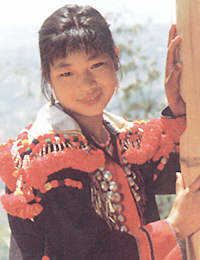 The De'ang ethnic minority has a population of 15,462 (as of 1990), distributed over a vast area. Most De'ang people live in Dehong Dai-Jingpo Autonomous Preference and in Lincang Preference in Yunnan Province. Some are also scattered in Baoshan, Simao, Luxi, Zhenkang and other counties in Yunnan.
The De'ang ethnic minority has a population of 15,462 (as of 1990), distributed over a vast area. Most De'ang people live in Dehong Dai-Jingpo Autonomous Preference and in Lincang Preference in Yunnan Province. Some are also scattered in Baoshan, Simao, Luxi, Zhenkang and other counties in Yunnan.
The De'ang people have their own language, which belongs to the Wa-De'ang branch of the Mon-Khmer Austronesian of the Austroasiatic Phylum. Most De'ang people can speak Chinese and languages of Dai and Jingpo. Because the De'angs have no written script of their own, Chinese is widely used as the written language.
The De'ang ethnic minority is one of the oldest tribes living in the southwest frontier region. They date back to the ancient Pu people who lived in the Nujiang River reaches in the second century. They successively submitted to the Han (206BC-220AD), Jin (265-420) dynasties and Nanzhou and Dali kingdoms. In the Sui (581-618) and Tang (618-907) dynasties, they were called Mangman (mang barbarians), Puziman (Puzi barbarians), etc. After the Yuan Dynasty (1271-1368), they were brought under the control of the Dai ethnic minority. Most of the De'ang people mix with the Han, Dai, Jingpo, Lisu and other ethnic minorities. After the founding of PRC in 1949, they were named the Benglong ethnic minority and in 1985, officially renamed the De'ang ethnic minority at their request.
The De'angs, who took to farming since ancient times, grow both wet and upland rice, corn, buckwheat and tuber crops as well as walnut and jute. The De'angs have been great tea drinkers since very early times, and now every family has tea bushes growing among vegetables, banana, mango, papaya and pomegranate trees in a garden around the house.
The De'angs are Hinayana Buddhists. Most villages have a temple. The monks live on the offerings of their followers. Their daily needs are provided by the villagers in turn. Being Buddhists, the De'angs in some localities do not kill living creatures. In the past, to avoid killing living creatures, the De'angs did not raise pigs or chickens, and only a rooster was kept in each village to herald the break of day.
The most important traditional festival of the De'ang ethnic minority is the Caihua Festival (the Flower Picking Festival). It is mainly celebrated in Luxi County on Qingming day (April 5th). De'ang people also have many festivals related to Buddhism, of which the most important one is the Water Splashing Festival. It falls on the seventh day after the Qingming Festival. People wash the dust off Buddhist statues with "water dragons". They also splash water at each other as an expression of good wishes. Then, they form a long line behind elephant-foot drums and throng to the waters beside springs and rivers, celebrating the New Year by chasing and splashing water at each other.
Both the Close-Door Festival and the Open-Door Festival are also important. The Close-Door Festival is held on September 15th in the Dai ethnic minority calendar, and the Open-Door Festival comes three months after the Close-Door Festival, namely on December 15th, which marks the end of the fasting.
